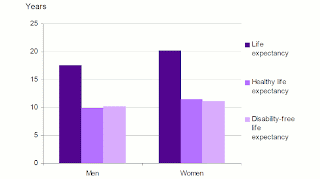 Most people reading this blog will be interested in money - or at least the best way to multiply it - but, as we all know, it's not everything.
Most people reading this blog will be interested in money - or at least the best way to multiply it - but, as we all know, it's not everything. We have said before that 'you should prepare for a longer retirement'. Fine. So what's the problem?
Well - your active retirement might be a lot shorter than you are expecting.
You may recall how we have argued that 'financial independence is measured in years' - the number of years' worth of income you have accumulated. You will usually calculate this based on your current expenditure (and remember the idea is to reduce expenditure as much as possible). You probably won't have factored in the cost of medical care.
As reported recently in Citywire, life expectancy (in the UK, at least) is increasing (which is good) but the number of healthy years you can expect to live is not keeping pace (which is bad).
 |
| ONS, quoted in Citywire |
Chapter 3 of the 2012 ONS Pensions Trends Report deals with life expectancy and healthy ageing.
In 2008, the latest year for which figures are available, UK men at age 65 had 9.9 years of healthy life expectancy, while women had 11.5 years. However, their total life expectancy was longer 17.6 and 20.2 years respectively, with the remaining years spent in ill health or suffering a disability. The numbers vary depending on where you live and what employment you had.
If lack of good health involves moving to a care home, this can reach an incredible cost of £700-£1000 a week. How many years of that could you afford for you and your partner?
The main health problems affecting economically active people over age 60 in April-June 2011 related to the heart, blood pressure and circulatory system; legs or feet; and back or neck.
So, health in retirement is an important factor - both for your enjoyment of life but also for your finances. However, while life expectancy of older people is continueing to extend, year by year, 'healthy years in retirement' is not increasing as quickly. A considerable proportion of retirement is likely to be spent in ill-health or with a disability.
So the key issue is health - and continuing health in retirement. Is there realistically anything we can do about this?
The fatalistic approach would be to say that it is primarily down to your genetic inheritance - and that's that - there is not much you can do. (A bit like buying a market tracker fund and hoping for the best.)
However, I am not so sure I agree fully with that (although it is clearly one of the key influences): medical discoveries every day seem to be showing that what we eat (and how much we eat) can have a significant impact on healthy life expectancy.
There is evidence of trends for three health-related factors in recent years:
- a decline in smoking (which is good)
- a decline in the general level of physical exercise (which is bad)
- increase in obesity (which is really bad)
I can work on the exercise. And I have found a way of maintaining a healthy weight that seems to have wider health benefits, which is featured on another blog I am developing: the On/Off Fasting Diet. Basically you can lose weight, safely and effectively by just not eating on the odd day or three a week.
I am not a financial advisor and the information provided does not constitute financial advice. You should always do your own research on top of what you learn here to ensure that it's right for your specific circumstances.
No comments:
Post a Comment